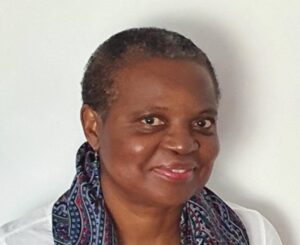 Since her recent retirement, Nesta Hatendi has decided to write. The first of her short stories is about to be published. Based on her humanitarian and international development experiences, mainly in Sub- Saharan Africa, she developed an interest in ageing and the resulting intergenerational dynamics. She lives between Zimbabwe and Australia.
Since her recent retirement, Nesta Hatendi has decided to write. The first of her short stories is about to be published. Based on her humanitarian and international development experiences, mainly in Sub- Saharan Africa, she developed an interest in ageing and the resulting intergenerational dynamics. She lives between Zimbabwe and Australia.
Lost Memories by Nesta Hatendi
As I tried to relax in Mai’s lounge on the old black sofa with blue cushions sewn many years ago, I felt my despondency weighing me down. A black and white wedding photo of my parents, in an old picture frame, still hung on the wall. My mother was sitting beside me, no longer reflecting the youthful bloom of a blushing bride. Now a shell of her former self, she was silent while Maidei her caregiver fussed over her well-being and anticipated her every need. Maidei had been filling a vacuum my sister and I had created by moving to the UK. We had never expected that Mai would ever need us, as she did now.
I had arrived at Harare International Airport the night before after a long flight. In the arrivals area, I suffered confusion temporarily over whether the Immigration Officer would classify me as a visitor or returning resident since I had been away for some time. As I approached the Immigration Desk with my completed entry forms, the Immigration Officer glanced at me, then over my documents. She gave a perfunctory smile and greeting before she handed back my stamped passport. As I approached the baggage carousel to collect my suitcases, I felt a sense of relief permeate through me. I was now on home soil. Coming home to see Mai made me realise how homesick I had been.
No-one was waiting to welcome me at the airport. That is the way I wanted it. Instead, I hailed an airport taxi which charged me $ US 40, a rip-off for the short distance to Msasa Park. Now home, I entered the lounge, and Maidei greeted me like a long lost relative, her conversation punctuated by numerous questions while Mai tried to understand what all the fuss was about. It eventually dawned on her as she stared at me. She was overcome with joy and tears as she embraced me while seated. I could sense that it was taking Mai some time to absorb the situation while Maidei in her excitement kept repeating,
‘Mbuya, don’t you remember her? It’s your daughter Chenai, the one you keep talking about. She is here now! Say something!’
Mai’s response was to stare at me and keep repeating my name in a low whisper, over and over again as she clutched my hand, stroking it incessantly.
After making Mai comfortable, Maidei joined me in the spare bedroom as I was unpacking my suitcase. In a low voice, she filled me in about Mai’s deterioration of health since my last phone call.
‘I am so glad that you came. You can see Mbuya for yourself. I could not explain everything on the call because she still hears a lot. The doctor you asked to do home visits explained her illness to me, an advanced form of dementia. I was told that all we can do is make her comfortable. That is all I am doing really and talking to her as we used to, even though she rarely responds. I am so glad you are back!’
I unpacked a small parcel and handed it to Maidei. Overcome with emotion, I embraced her briefly and said in a faltering voice, ‘Maidei, if only you knew how inadequate I feel, giving you such a small token of our appreciation. If it was not for you, we would not be where we are. We have left you with Mai, and it’s no easy task looking after someone who can no longer communicate what she wants or how she feels. Mukoma Shylet and I can never repay you.’
Maidei opened the parcel of a yellow flowery summer dress and an envelope containing money, and she responded, ‘Mukoma Chenai, I know how hard it is to find work in this country of ours. I’m so grateful that you employed me, and you trust me with your mother’s life. When I have time off, and the agency caregiver you arranged comes to relieve me, I feel disorientated because I have become so close to Mai. Thank you for paying me on time. Thank you for these gifts.’
Maidei later joined us in the lounge for the rest of the evening as we feasted on traditional food interspersed with conversation about old and new stories. There was a constant stream of neighbours and family curious to meet Mai’s prodigal child. Soon the buzz and conversations dried up after the perfunctory cups of tea and refreshments. The visitors left, with a myriad of excuses about unattended homes, supervision of homework and meals to cook. This deluge, I could sense had been an ordeal for Mai who had not said much the whole evening. Maidei then ushered me to bed, saying I needed rest from my jetlag.
Before Mai’s illness, she had moved together with Maidei into her compact two-bedroom house in Msasa Park. She was now one of the few remaining first buyers of the housing scheme built after Independence. You could always tell the difference between the homeowners with their smart well-kept houses and immaculate gardens; in contrast to those occupied by transient lodgers with skewed curtains, junk-filled yards and no lawns to speak of.
When Mai first moved in, she was so proud she had a housewarming party in the backyard. My sister Mukoma Shylet and I were not able to attend. However, pictures of the celebration were plastered on Facebook by one of Mai’s nieces; with everyone looking the worse for wear after consuming copious quantities of alcohol and the proverbial celebratory meal of sadza, rice, chicken, coleslaw and soft drinks. We had heard that sometimes when Mai was feeling lonely although not alone, she would say that she envied her relatives and friends who had children living nearby because at least they saw each other at weekends and during the holidays. She missed living with my sister and me and the boasting about our accomplishments, like her age mates at family gatherings. After retirement from teaching, Baba had disappeared some years back, swept away by the euphoria of Independence. The last we heard of him were rumours that like others at that time, he had ‘traded’ in our mother and found a new model. A new wife half his age. My mother never got over the affair.
Some years after Independence, I left for the UK followed by my sister, Mukoma Shylet, who like me had joined the exodus of yet more economic migrants looking for a better life. She was now working as a caregiver for an old English spinster on a remote farm in rural Hampshire. Shylet never remarried after a disastrous union to her childhood sweetheart Jim who had emigrated with her. A typical Shona man with an ingrained strong rural background, he just could not adjust to the ‘liberal’ ways of life in the UK where Shylet was treated as an equal under the law. Both worked full time with no maid, a luxury they had left back home. The marriage was doomed soon after Jim lost his job and succumbed to drink and despair, leaving Shylet to fend for the family.
Shylet’s UK immigration papers had not been valid for a while, so there was no way she was going to visit Mai anytime soon. She was initially an Accounts student at a polytechnic with an obscure name and then ran out of money to pay for her course before overstaying her welcome. Now living under the radar, she was employed by whoever was willing to pay her below the tax barrier, so helping to perpetuate her illegal immigrant status. But Shylet never defaulted from sending money for Mai via Western Union. It was her way of coping with a nagging conscience over both of us being away from home and leaving Mai childless.
The occasions when my sibling and I came together at Mai’s new house had been few and far between. The last time was Easter, three years ago. Even then, that had been a mission, what with the exorbitant holiday airfares to Harare. We habitually spent a lot of money on phone calls to Mai. She finally got her own cell phone with Whatsapp. At 78 years, however, no matter how many times we told her how to retrieve the messages, the instructions went through one ear and out the other. She never learnt to text back in response, saying it was too complicated and someone was bound to offer to read the messages for her. There were no secrets.
Despite my financial hardships, my conscience had been telling me that I should go home and assess Mai’s situation for myself. I always had a special bond with her, although with my sister, we never talked of Mai having a favourite. Of late, my telephone calls to her had been leaving me unsettled. Sometimes I could hear in the background, Maidei prompting Mai and reminding her who I was before Mai gave up trying to understand. Instead, she would echo the standard answer back to me, ‘I am fine.’ There was no meaningful conversation after the initial greetings before she passed the phone on to Maidei. The irony was never lost on me, that we were caring for others in the Diaspora while raising money to pay strangers who cared for our own mother back home. I would occasionally end the conversation rather abruptly, before dissolving into tears at the futility of the calls. Concern for my mother from such a distance seemed so self indulging. My two consolations were that at least I could send remittance back home and Maidei was doing her best. Even then, a niggling feeling would occasionally envelop me, and I would sink into a low level of depression. Money and material things were no substitute for my being at home with Mai.
So during this visit, I had extended my holiday, having applied for unpaid leave which I could ill afford. One could also not arrive empty-handed, what with all the relatives to see, including those in the rural areas. Mai always had a long list of all the people we were obliged to visit—passing condolences for all the missed funerals, congratulating those with new additions to the extended family, leaving a parcel or cash with expectant relatives. Little did they know that both Shylet and I were working more than one job and sometimes survived on one meal a day to raise the cash so we could arrive back home, the ‘successful ones’ from the Diaspora. Well-meaning friends would advise, why not just send your mother the money for her needs and those of the hangers-on? The sum would undoubtedly be far less than the airfares. People want money for school fees, medical bills, grocery and the like; not parcels of discount clothes which they could easily buy from the local flea markets.
As the days passed, I soon caught up on Mai’s welfare as Maidei opened up, mentioning in passing that visitors and relatives who used to go in and out of Mai’s house like a railway station, no longer came. The caregiver reported that no-one ever revealed they felt uncomfortable seeing Mai in an increasingly lethargic state, unable to recall the time or day of the week. Instead, they behaved as if they thought her dementia was infectious, and it was better to stay away. Her hearing was still acute, and there were fleeting moments when one could sense from her eyes, some recognition and presence of her former self.
My euphoria at being back home soon began to wear thin. There was no doubt that Mai was being looked after very well. She was clean, well-fed; albeit a little overweight because she was no longer walking or keeping fit doing housework. She appeared comfortable, and the pantry was full. However, one could tell, Mai’s health was deteriorating. She was no longer able to dress or bathe herself. The disorders affecting her brain were taking their toll. Even Maidei, the eternal optimist, said that Mai was not herself anymore and her monotonous past times were now sitting in her wheelchair, gazing in the distance, with her head in a lopsided manner. All-day in the veranda chasing the sun, day in and day out. If no one moved her into the shade, she would suffer from sunburn in the blazing sun.
When she was not dozing, I would sometimes join her and try and start a conversation.
‘ Mai, Mai. Can you hear me? I didn’t want to wake you earlier. You had some visitors from the Mothers Union. You remember, your friends who you used to meet at church. The ones in the choir?’ I paused looking for signs that she was following what I was saying. She looked at me blankly.
I continued, ‘They came in their smart uniforms like yours and brought groceries. They mentioned on Sunday when I went to the morning service that they would visit and say a few prayers. This time they did not sing your favourite hymns because we were afraid to wake you since Maidei says you did not sleep very well last night.’
I sensed she had heard me as Mai turned her head and stared through me, into the distance.
Gone were her flashbacks on the poor state of rural hospitals, the reminiscing about when she was Sister in Charge at Nhowe Mission or my father’s days as a promising head-teacher before Independence. In a slurred voice, she could still respond sporadically to greetings, after being prompted. That was the limit of her conversations. I wanted to share so many memories of life before I left her for the UK. I remembered the time we stayed with her mother in the rural areas. We slept as children with my cousins, all squashed in one bed, talking in whispers through the night. I also recalled when Mai used to keep chickens and sell eggs to make ends meet. She had always been industrious. Even with a regular salary before retirement, she would sew maids and children’ uniforms for sale at the Mission.
The mother in front of me was not the mother I knew. Alzheimer’s was holding her hostage as she dosed in and out of her world. Even the energy to lift her arms and greet people with a handshake had now faded away. She reminded me of a new-born baby who ate and slept, ate and slept. The only difference was that Mai was not growing up, she was not crying for attention. She was just there, with her closeted memories on a journey where none of us could accompany her. I had come too late. She was now lost to us all, forever.



